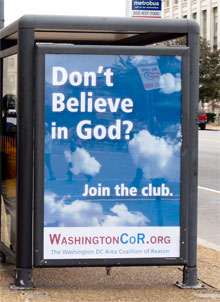| Fred Edwords | Comment is free | guardian.co.uk

Washington DC nontheist, atheist bus shelter advert The Coalition of Reason bus shelter advertisement, in Washington, DC. Photograph: CoR
New advertisements on Washington DC bus stop shelters ask a simple question: "Don't believe in God?" After that gets your attention, they answer it: "Join the club."
More than a figure of speech, this rejoinder is a direct invitation to join one of the dozen local non-theistic groups that have come together as Washington CoR – the Washington DC area Coalition of Reason.
Believers in traditional religion are often shocked at such ads. Since 2008, this message and others like it have been placed on billboards, buses, subway trains and at subway stations in cities across the United States. But the ads don't actually address believers. They address non-believers, in an effort to get them "out of the closet", or at least, to let them know they aren't alone. The goal is to end a conspiracy of silence of sorts, where quietness is next to godlessness, and begin the process of giving non-theistic Americans their place at the table.
But why is this happening now? Well, it actually began in 2004 with the emergence of what the media quickly dubbed the "new atheism". In the wake of that, godless Americans suddenly found themselves in a sweet spot. They were no longer so controversial as to be beyond the pale, yet just controversial enough to be endlessly interesting.
Other groups have gone through a similar phase. Remember when being interracially married would get you air time? Or being transsexual? These controversies have passed, of course. And this phase will pass for non-theists, too. But not yet. And so, in city after city where these ads are put up, reaction follows. Sometimes in the form of a backlash – which only multiplies their power.
So, the United Coalition of Reason has been striking while the iron is hot, stoking the flames of public interest in secularism, anti-clericalism and religious diversity to bring the growing number of godless groups together into local coalitions. Thus organised, they pool their efforts in a common website that links to all the groups, creating a sort of online one-stop-shopping for the religiously disaffected and spiritually uninterested. That website is then publicised through the ads; and via the media attention and internet buzz the ads generate, more people emerge as interested non-theists and coallesce into the groups. The size of the freethought and humanist community thereby expands.
In the United States, evangelical Christianity dominates the field of religious advertising. Which only makes atheist messages stand out more. Further, because freedom of speech and freedom of the press are enshrined in the US constitution, transit companies that allow religious advertising can't ban non-theistic alternatives. So the ads must be allowed to run.
And when they do – over and over and across the land – people start getting used to them. This increases public tolerance of dissenting views and gives more people permission either to be open about their unbelief or even to begin questioning their faith.
So, in the end, everybody wins because society becomes more open, inclusive and free.



No comments:
Post a Comment